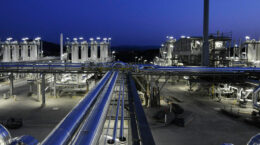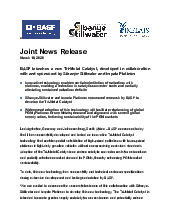BASF launches a new Tri-Metal Catalyst, developed in collaboration with and sponsored by Sibanye-Stillwater and Impala Platinum
- Innovative technology enables partial substitution of palladium with platinum, enabling a reduction in catalytic converter costs and partially alleviating sustained palladium deficits
- Sibanye-Stillwater and Impala Platinum sponsored research by BASF to develop the Tri-Metal Catalyst
- Widespread adoption of this technology will facilitate rebalancing of global PGM (Platinum Group Metals) demand and alignment with current global supply ratios, furthering sustainability of the PGM markets
Ludwigshafen, Germany and Johannesburg, South Africa – BASF announced today that it has successfully developed and tested an innovative Tri-Metal Catalyst technology that enables partial substitution of high-priced palladium with lower-priced platinum in light-duty gasoline vehicles without compromising emissions standards. Adoption of the Tri-Metal Catalyst can reduce catalytic converter costs for automakers and partially rebalance market demand for PGMs, thereby enhancing PGM market sustainability.
To date, this new technology has successfully met technical customer specifications during extensive development and testing undertaken by BASF.
“We are excited to announce the successful outcome of this collaboration with Sibanye-Stillwater and Impala Platinum to develop this new technology. The Tri-Metal Catalyst is intended to create greater supply certainty for our customers and potentially reduce their costs,” said Matthias Dohrn, Senior Vice President, Precious and Base Metal Services at BASF. “When there is a challenge in the marketplace, customers can count on BASF to deliver innovative solutions to meet their needs.”
Slightly more palladium is produced annually than platinum. However, current demand for palladium from the automotive catalytic converter industry is about three times more than the demand for platinum. This structural deficit in the palladium market has resulted in sustained market deficits in palladium. This contrasts sharply with ongoing platinum market surpluses.
Neal Froneman, CEO, Sibanye-Stillwater commented: “Having co-invested in this research with BASF and Impala Platinum to proactively supply our customers with a timely solution to the anticipated palladium deficits we are currently experiencing, we are delighted with the availability of this technology. As a company, we are committed to investing in market development opportunities that will meaningfully ensure the sustainability of the PGM industry for the benefit of all our stakeholders, including the end users of our metals.”
The increase in the palladium demand is in large part being caused by a market imbalance from tightening emission regulations in China, Europe and India, and a market shift from light-duty diesel to light-duty gasoline vehicles in Europe. This is resulting in higher costs for automakers.
Nico Muller, CEO, Implats (Impala Platinum) said: “At Implats we are committed to investment in market development for our primary products. We are pleased to have anticipated the need for the development of alternative PGM metal ratios in catalytic converters. We have been part of a team which has worked for several years to ensure a practical and cost-efficient solution for our common customer base. We believe the outlook for our primary products remains robust, especially when demand projections are more closely aligned to the ratio in which our metals are produced. We are proud to have contributed to a solution which will normalize longer-term demand with supply and benefit all members of the value chain – from miners, to refiners, fabricators and OEMs.”
BASF uses PGMs to produce catalysts that protect the air we breathe, produce the fuels that power our world, and ensure efficient production of a wide variety of chemicals, plastics and other products.




